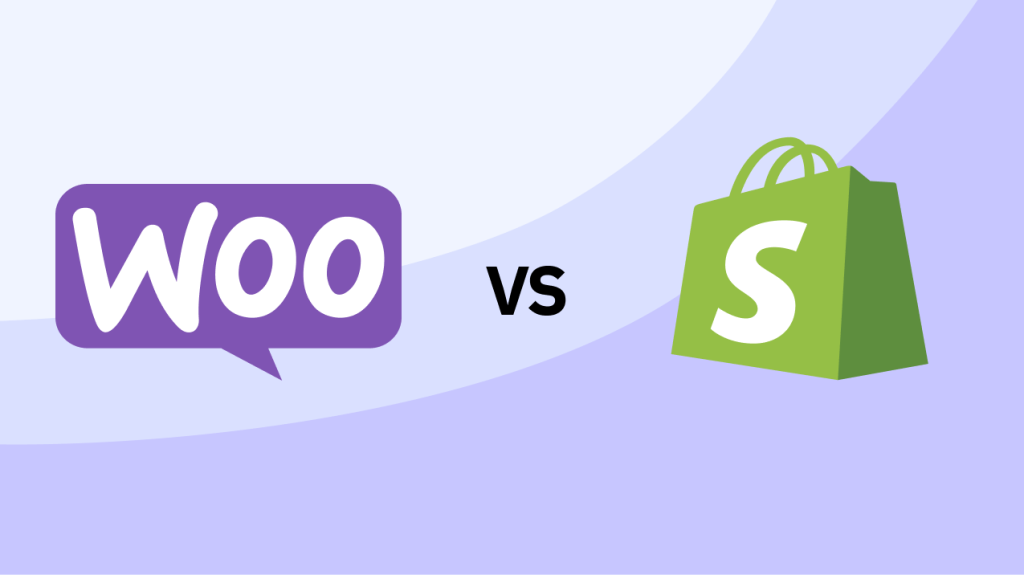In the ever-evolving tech world, two giants continue to fight for global dominance in the field of e-commerce development: Shopify and WooCommerce. As we move through 2024, both platforms have unveiled new features, making the decision of which to choose more challenging. This comparison will take a detailed look at both platforms and discuss their strengths and weaknesses, so you can make an informed decision about which one will be the best choice for your online shop.

What is WooCommerce?
WooCommerce is a flexible, open-source eCommerce plugin designed for WordPress, the most popular content management system (CMS). WordPress started in 2003 as a fork of b2/cafelog. It was initially a simple blogging tool but soon expanded to become arguably the best choice for building web applications, including portfolio and business sites, as well as online shops. Some of the most popular sites in the world are run on WordPress, including those of NASA, the White House, Beyoncé, and others. WooCommerce, on the other hand, allows users, ranging from small to large-sized online merchants, to turn their WordPress sites into fully functional online stores. WooCommerce provides a wide range of features and customization options for selling physical and digital products, as well as services. Users can extend its functionality with additional plugins, themes, and custom development, making it a versatile choice for businesses looking to create an online presence or expand their sales online. Its integration with WordPress makes it a go-to choice for users already familiar with the WordPress ecosystem. WooCommerce is also the most popular e-commerce platform, As of 2024 it powers more than 6,000,000 sites.
Key Features:
- Open-source: Free to install and use, with costs associated with hosting, themes, and additional plugins.
- WordPress Integration: Seamlessly integrates with WordPress, making it ideal for those already using WordPress for their website.
- Customizability: Highly customizable with access to thousands of plugins and themes, both free and premium.
- Product Types: Supports a wide range of product types including physical, digital, and services.
- Payment Options: Offers numerous payment gateways through extensions, including PayPal, Stripe, and bank transfers.
- Scalability: Can scale from small shops to large online stores, though requires more technical management for larger operations.
- Community Support: Large community support with extensive documentation, forums, and third-party resources.
What is Shopify?
Shopify is a comprehensive, cloud-based eCommerce platform that allows individuals and businesses to create and manage their own online stores. It offers a wide range of tools and features to help users sell products and services online and through multiple channels including web, mobile, in-person, and through social media. Shopify is designed to be user-friendly, enabling people with little to no technical expertise to set up their store, manage inventory, process payments, and handle shipping. It operates on a subscription model, offering various plans to cater to different business sizes and needs. With its extensive app marketplace, Shopify users can extend the functionality of their stores with various plugins, ranging from SEO tools to inventory management solutions. Shopify is favored for its ease of use, scalability, and comprehensive support system, making it a popular choice among entrepreneurs and established businesses looking to grow their online retail presence. As of today, around 4,000,000 websites use Shopify to power their e-commerce shop. This makes it the second most popular e-commerce solution after WooCommerce and well ahead of other platforms that can run e-commerce platforms such as Wix or Squarespace.
Key Features:
- Hosted Solution: Shopify is a fully hosted platform, meaning you don’t have to worry about buying web hosting or installing software anywhere.
- Ease of Use: Known for its ease of use with a drag-and-drop interface, comprehensive dashboard, and intuitive setup process.
- Subscription Model: Operates on a monthly subscription model with different plans to suit various business sizes and needs.
- Multi-Channel Selling: Supports selling on multiple channels including online, social media, and through physical POS systems.
- Built-in Tools: Comes with a range of built-in tools for SEO, marketing, analytics, and more, without the need for additional plugins.
- App Store: Access to an extensive app store, allowing users to extend the functionality of their store with numerous third-party apps and services.
- Security and Reliability: Provides SSL certificates for secure transactions and is responsible for maintaining the platform’s security and performance.
- Customer Support: Offers 24/7 customer support through phone, email, and live chat, which is particularly helpful for beginners.
Shopify vs. WooCommerce: Which Platform to Choose for your e-commerce shop?
Let’s now dive into a detailed comparison between the two e-commerce platforms in order to choose the one that will better suit your business.
Ease of Use
Shopify is the pure definition of user-friendly software. Its ‘sign-up and go’ approach allows even the most novice users without prior technical knowledge to launch their online store in just a few minutes. The platform offers a flawless user experience, integrated hosting, and no technical know-how required for initial setup or ongoing maintenance.
WooCommerce, on the other hand, is at its core a WordPress plugin. It requires a bit of effort to set it up (hosting, domain, and site configuration), however, once you manage to set up hosting, domain, and configure the site, you will definitely be happy with the end result and you will see that the initial effort will be worth it. At the same time, for those already familiar with WordPress, the learning curve is minimal, and the platform offers unparalleled flexibility and customization options.
Winner: Shopify
Customization and Flexibility
WooCommerce has an edge here. Being open-source, it allows full access and modification of its code, allowing for unparalleled flexibility and literally endless customization possibilities. Whether it’s tweaking the checkout experience or integrating complex membership systems, WooCommerce can accommodate virtually any need. This flexibility, however, comes with the necessity for either coding knowledge or the budget to hire a developer.
Shopify offers a wide range of themes and apps to extend functionality, but its closed system means limitations do exist. For businesses that require a straightforward e-commerce solution, these limitations are seldom an issue. However, for those needing intricate customizations, Shopify might feel restrictive.
Winner: WooCommerce
Performance and Security
Both platforms offer robust solutions for performance and security, but their approaches differ.
Shopify, being a hosted solution, takes care of all hosting-related performance optimizations and security updates. This peace of mind is a significant plus for business owners who prefer not to deal with the technicalities of maintaining a secure, fast-loading website.
WooCommerce requires a bit more hands-on management, with site performance and security depending on the choices made for hosting, plugins, and security measures. However, this also means that WooCommerce users have the power to optimize their site to their exact specifications, potentially achieving superior performance levels and outperforming the competitors.
Winner: Tie
Pricing
Shopify operates on a subscription model, with plans that cater to businesses of all sizes. While this includes hosting and access to a suite of features, the costs can add up, especially with the addition of premium apps and transaction fees.
WooCommerce is free as a plugin, but associated costs such as hosting, domain registration, and premium plugins or themes can vary widely. The open-source nature of WooCommerce means many free plugins are available, potentially keeping costs lower if you’re willing to put in the work.
Winner: WooCommerce
The Verdict – Choosing the Right Platform for Your Business
Shopify and WooCommerce are both excellent choices to create an online store. The decision between Shopify and WooCommerce hugely depends on individual business needs, technical ability, and growth expectations.
Shopify remains the go-to for those seeking simplicity, speed, and an all-in-one solution without the hassle of technical involvement.
WooCommerce, with its edge in customization and flexibility, is ideal for those who demand control over every aspect of their e-commerce experience and are willing to excel on the technical side and have the necessary capabilities to do so.
Both platforms are powerful e-commerce solutions with plenty of options to choose from. Choosing the right platform for your online business requires careful consideration of the specifics of the company and the level of complexities involved.
Read more: Top 10 Open Source E-commerce Platforms

